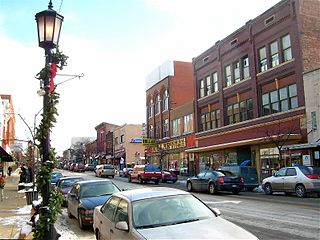
Spanish moss is an epiphytic flowering plant that often grows upon larger trees in tropical and subtropical climates, native to much of Mexico, Bermuda, the Bahamas, Central America, South America, the southern United States, and the West Indies and is also naturalized in Queensland (Australia). It is known as "grandpas beard" in French Polynesia. In the United States from where it is most known, it is commonly found on the southern live oak and bald-cypress in the lowlands, swamps, and savannas of the southeastern United States from southeast Virginia south to Florida and west to Texas and southern Arkansas.
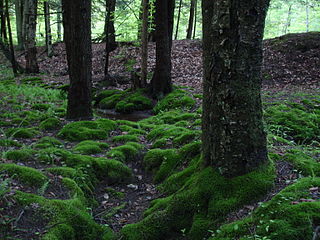
Mosses are small flowerless plants that typically grow in dense green clumps or mats, often in damp or shady locations. The individual plants are usually composed of simple leaves that are generally only one cell thick, attached to a stem that may be branched or unbranched and has only a limited role in conducting water and nutrients. Although some species have conducting tissues, these are generally poorly developed and structurally different from similar tissue found in vascular plants. Mosses do not have seeds and after fertilisation develop sporophytes with unbranched stalks topped with single capsules containing spores. They are typically 0.2–10 cm (0.1–3.9 in) tall, though some species are much larger. Dawsonia, the tallest moss in the world, can grow to 50 cm (20 in) in height.

Looking Glass Studios, Inc. was an American video game developer based in Cambridge, Massachusetts. The company was founded by Paul Neurath with Ned Lerner as Blue Sky Productions in 1990, and merged with Lerner's Lerner Research in 1992 to become Looking Glass. Between 1997 and 1999, the company was part of AverStar. Following financial issues at Looking Glass, the studio shut down in May 2000. Notable productions by Looking Glass include the Ultima Underworld, System Shock and Thief series.

Sphagnum is a genus of approximately 380 accepted species of mosses, commonly known as "peat moss". Accumulations of Sphagnum can store water, since both living and dead plants can hold large quantities of water inside their cells; plants may hold 16–26 times as much water as their dry weight, depending on the species. The empty cells help retain water in drier conditions. Hence, as sphagnum moss grows, it can slowly spread into drier conditions, forming larger mires, both raised bogs and blanket bogs. Thus, Sphagnum can influence the composition of such habitats, with some describing Sphagnum as 'habitat manipulators'. These peat accumulations then provide habitat for a wide array of peatland plants, including sedges and ericaceous shrubs, as well as orchids and carnivorous plants. Sphagnum and the peat formed from it do not decay readily because of the phenolic compounds embedded in the moss's cell walls. In addition, bogs, like all wetlands, develop anaerobic soil conditions, which produces slower anaerobic decay rather than aerobic microbial action. Peat moss can also acidify its surroundings by taking up cations, such as calcium and magnesium, and releasing hydrogen ions. Under the right conditions, peat can accumulate to a depth of many meters. Different species of Sphagnum have different tolerance limits for flooding and pH, so any one peatland may have a number of different Sphagnum species.

The Lister Motor Company Ltd. is a British sports car manufacturer founded by Brian Lister in 1954 in Cambridge, England, which became known for its involvement in motorsport. Sold in 1986, Laurence Pearce produced variants of the Jaguar XJS before producing a bespoke sports car, the Lister Storm. In 2013, Lister Cars was acquired by Lawrence Whittaker's company Warrantywise. Production of the original sports car restarted in 2014 and ten continuation Lister Jaguar Knobblys were built to celebrate Lister’s 60th Anniversary. In 2016, the company announced the build and sale of the Lister Knobbly Stirling Moss. On 31 January 2018, the Lister LFT-666 based on the Jaguar F-Type was announced.
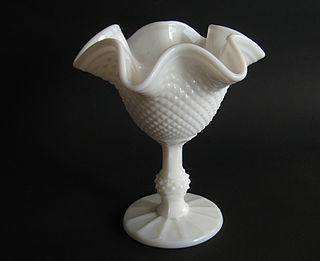
Milk glass is an opaque or translucent, milk white or colored glass that can be blown or pressed into a wide variety of shapes. First made in Venice in the 16th century, colors include blue, pink, yellow, brown, black, and the white that led to its popular name.
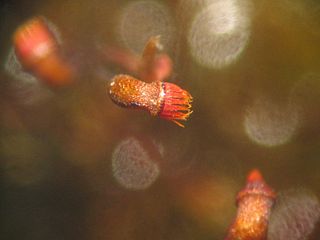
The Bryopsida constitute the largest class of mosses, containing 95% of all moss species. It consists of approximately 11,500 species, common throughout the whole world.
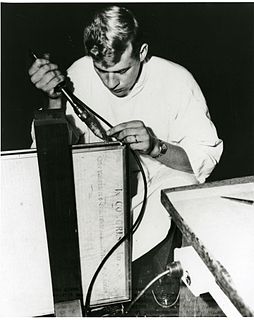
The Libbey-Owens-Ford Company (LOF) was a producer of flat glass for the automotive and building products industries both for original equipment manufacturers and for replacement use. The company's headquarters and main factories were located in Toledo, Ohio, with large float glass plants in Rossford, Ohio, Laurinburg, North Carolina, Ottawa, Illinois, Shreveport, Louisiana, and Lathrop, California. The company was formed in 1930 by the merger of Libbey-Owens' sheet-glass operation with the Edward Ford Plate Glass Company, both located in Toledo.

The Field Elm cultivar Ulmus minor 'Hunnybunii' was originally identified as U. nitens var. Hunnybunii Moss by Moss in The Cambridge British Flora (1914). 'Hunnybunii' was reputed to have been commonly planted in the parklands and hedgerows of Essex, Cambridgeshire, and Huntingdonshire before the advent of Dutch elm disease. Melville considered the tree a hybrid of 'Coritana'.

The Field Elm cultivar Ulmus minor 'Sowerbyi', commonly known as the Sowerby Elm, was described by Moss in The Cambridge British Flora (1914). The tree, once referred to as the 'Norfolk Elm' by Smith, was commonly found in the hedgerows and woods of Norfolk, Cambridgeshire, and Huntingdonshire in the early 20th century before the advent of Dutch elm disease. Melville considered it a hybrid of 'Coritana'.

Moss Empires was a company formed in Edinburgh in 1899, from the merger of the theatre companies owned by Sir Edward Moss, Richard Thornton and Sir Oswald Stoll. This created the largest chain of variety theatres and music halls in the United Kingdom. The business was successful, with major variety theatres in almost every city in Britain and Ireland, and was advertised as the largest group in the world.

Charles Moss was an Anglican clergyman who served as Bishop of St David's from 1766 to 1774 and Bishop of Bath and Wells from 1774 to 1802.

Wells Fargo Center is a skyscraper in Seattle, in the U.S. state of Washington. Formerly named First Interstate Center when completed 36 years ago in 1983, the 47-story, 574-foot (175 m) tower is now the ninth-tallest building in the city, and has 24 elevators and 941,000 square feet (87,400 m2) of rentable space. The design work was done by The McKinley Architects, and it was owned by Chicago-based EQ Office.
Glava AS is a Norwegian industrial company with headquarters in Askim. The name is a portmanteau of the Norwegian word glassvatt, meaning glass wool. Glass wool used as insulation material is the company's main product. Production takes place at the company's production facilities in Askim and Stjørdal. Glava employs around 500 people, and in 2007 had a revenue just short of NOK 1,500 million.

The New England Glass Company (1818–1878), originally founded in Cambridge, Massachusetts and subsequently relocated to Toledo, Ohio, was established by Amos Binney, Edmund Munroe, Daniel Hastings, and Deming Jarves on February 16, 1818. It was renamed the Libbey Glass Company in 1892, then was bought by Owens-Illinois Glass Company, which spun it off as an independent company in 1993. The company produced both blown and pressed glass objects in a variety of colors, which had engraved, cut, etched, and gilded decorations. The firm was one of the first glass companies to use a steam engine to operate its cutting machines, and it built the only oven in the country that could manufacture red lead, a key ingredient in the making of flint glass. By the middle of the nineteenth century, the New England Glass Company was considered one of the leading glasshouses in the United States, best known for its cut and engraved glass.

Joan Howson (1885–1964) was a British stained glass artist of the Arts and Crafts movement. She trained at the Liverpool School of Art before becoming a student and apprentice to Caroline Townshend. They later developed a lifelong partnership creating stained glass works under the name of their company, Townshend and Howson.

The Field Elm cultivar Ulmus minor 'Hunnybunii pseudo-Stricta' was originally identified as U. nitens var. Hunnybunii pseudo-Stricta Moss by Moss in The Cambridge British Flora (1914). Moss regarded the tree as a "subvariety" of U. nitens var. 'Hunnybunii', with a narrower form.

